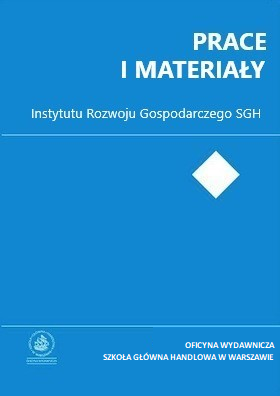Polityka stabilizacyjna jako kanał transmisji impulsów koniunkturalnych
Main Article Content
Abstract
Advancing international economic co-operation, considered both in institutional and - first of all - real terms makes economic policy be a channel of transmission of business situation impulses. Nationwide specific shocks, included monetary and fiscal policy, trough product exchange and flow of capital are subject to transmission of trading partners, which implies potential effects of economic policy proliferation. Traditional external effects of economic policy were considered within the Mundell-Fleming model, on the basis of which it was possible to almost unanimously determinate their impact on the surrounding. The development of theory consisted in eliminating fundamental impediments to the Mundell-Flaming model, not only concerning the Keynes concept. Additional factors have been considered, such as: intercyclical optimisation, size of country, the aftermath of money and assets division among countries and their impact on affluence as well as financing budgetary spending from taxes and treasury bounds issuance. Apart from the model assumptions and their modifications much depends on the nature of disruption: is it predicted or surprising, temporary or permanent, occurring at present or likely in the future. What should not be neglected is the fact whether the disruption occurs on demand or supply side, in a country or abroad. Moreover, it is of importance whether a real disruption is triggerd by demand shock or by supply shock. The results depend also on the completeness of international assets market, rigidity or flexibility of job supply and the way of budgetary spending financing. Taking into account all the additional factors leads to a concept that conclusions concerning external factors are no longer as apparent and unanimous as they used to be in the Mundell-Fleming model. (original abstract)
Article Details
References
Andersen T. M., Spange M., International Interdependencies in Fiscal Stabilization Policies, “European Economic Review” 2006, No. 5.
Baxter M, International Trade and Business Cycles. W: Handbook of International Economics, red. G. M Grossman, K. Rogoff, North Holland, New York 1995.
Bianconi M., Turnovsky S. J., International Effects of Government Expenditure in Interdependent Economies, “The Canadian Journal of Economics” 1997, No. 1.
Bussiere M., Fratzscher M., Muller G., Productivity Shocks, Budget Deficits and the Current Account, “ECB Working Paper Series” 2005, No. 509.
Corsetti G., Meier A., Muller G. J., International Dimensions of Fiscal Policy Transmission, http://www.hec.unil.ch/deep/evenements/Seminaire-papers/2007- 08/Muller-oct07.pdf.
Devereux M. B., Engel C., Monetary Policy in the Open Economy Revisited: Price Setting and Exchange-Rate Flexibility, “Review of Economic Studies” 2003, No. 4.
Dooley M. P., Folkerts-Landau D., Garber P. M., Savings Gluts and Interest Rates: The Missing Link to Europe, “NBER Working Paper” 2005, No. 11520. deLong B., John Taylor Blasts Off for the Gamma Quadrant, w: Brad De- Long’s Semi-Daily Journal: A Weblog. http://www.j-bradforddelong net/movable type/2004-2 archives/000519.html Dooley M. P., Folkerts-Landau D., Garber P. M., Savings Gluts and Interest Rates: The Missing Link to Europe, “NBER Working Paper” 2005, No. 11520.
Dornbusch R., Fischer S., The Open Economy Implications for Monetary and Fiscal Policy, “NBER Working Paper” 1987, No. 1422.
Duarte M., Obstfeld M., Monetary Policy in the Open Economy Revisited: The Case for Exchange-Rate Flexibility, “Journal of International Money and Finance” 2008, No. 6.
Eggert W., International Repercussions of Direct Taxes, “Finanz Archiv” 2000, No. 1.
Eichengreen B., The Blind Men and the Elephant, “Issues in Economic Policy” 2006, No. 1.
Erceg Ch. J., Guerrieri L., Gust Ch., Expansionary Fiscal Shocks and the Trade Deficit, Board of Governors of the Federal Reserve System, “International Finance Discussion Papers”2005, No. 825.
Evans P., Do Budget Deficits Affect the Current Account, Manuscript, Ohio State University 1990.
Frenkel J. A., Mussa M. L., Monetary and Fiscal Policies in an Open Economy, “NBER Working Paper” 1981, No. 575.
Frenkel J. A., Razin A., Budget Deficit and Rates of Interest in the World Economy, “NBER Working Paper” 1984, No. 1354.
Frenkel J. A., Razin A., Deficits with Distortionary Taxes: International Dimensions, “NBER Working Paper” 1986, No. 2080.
Frenkel J. A, Razin A., International Effects of Tax reforms, “The Economic Journal” 1989, Supplement.
Frenkel J. A., Razin A., The International Transmission and Effects of Fiscal Policies, “American Economic Review” 1986, No. 2.
Kim S., Roubini N., Twin Deficit or Divergence? Fiscal Policy, Current Account, and Real Exchange Rate in the US, “Journal of International Economics” 2008, No. 2.
Laursen S., Metzler L. A., Flexible Exchange Rates and the Theory of Employment, “Review of Economics and Statistics” 1950, November.
Lucas R. E., Supply-Side Economics: An Analytical Review, “Oxford Economic Papers” 1990, No. 2.
Mendoza E. G., Tesar L. L., The International Ramifications of Tax Reforms: Supply- Side Economics in a Global Economy, “The American Economic Review” 1998, No. 1.
Mundell R. A., Capital Mobility and Stabilization Policy under Flexible Exchange rates, “Canadian Journal of Economics and Political Science” 1963, No. 4.
Normandin N., Budget Deficit Persistence and the Twin Deficits Hypothesis, “Journal of International Economics” 1999,No. 1.
Obstfeld M., International Macroeconomics: Beyond the Mundell-Fleming Model, “NBER Working Paper” 2001, No. 8369.
Obstfeld M., Rogoff K., Exchange Rate Dynamics Redux, “The Journal of Political Economy” 1995, No. 3.
Peren Arin K., Koray F., International Transmission of Fiscal Shocks: An Empirical Investigation, Louisiana State University Department of Economics Working Paper No. 2006-03.
Persson T., Tabellini G., Double- Edged Incentives: Institutions and Policy Coordination, w: Handbook of International Economics Vol. III, red. G. Grossman, K. Rogoff, North-Holland, New York 1995.
Roche M. J., Government Spending and the International Business Cycle, “The Canadian Journal of Economics” 1996, No. 4.
Roubini N., Current Account and Budget Deficits in an Intertemporal Model of Consumption and Taxation Smoothing. A Solution to the “Feldstein-Horioka Puzzle, “NBER Working Paper” 1988, No. 2773.
M. Rubaszek, Nierównowaga globalna: przyczyny oraz możliwe rozwiązania, „Bank i Kredyt”, lipiec 2006.
Taylor J. B., The U.S. Current Account: Recent Trends and Policies, U.S.Treasury Office of Public Affairs 2004, JS 2084.
